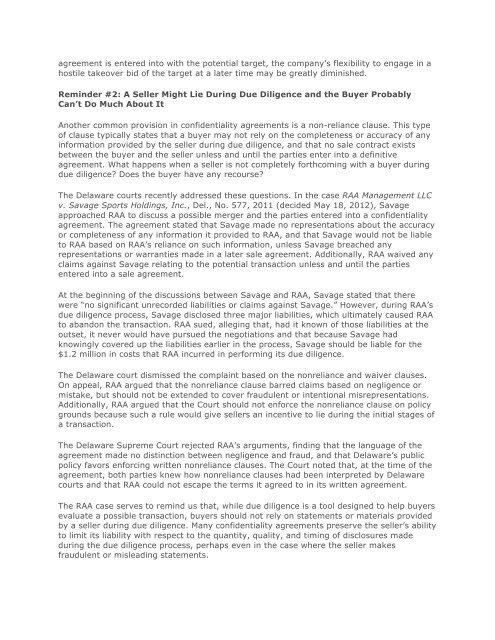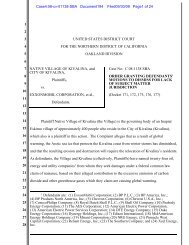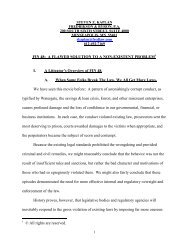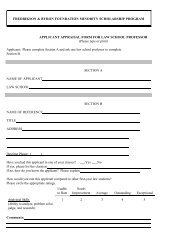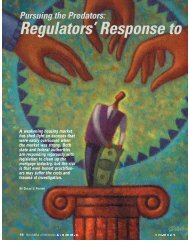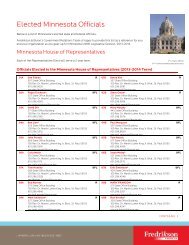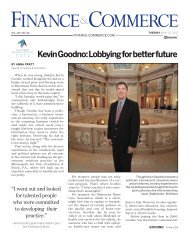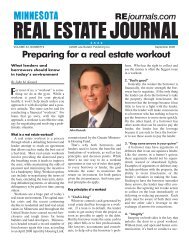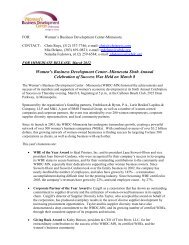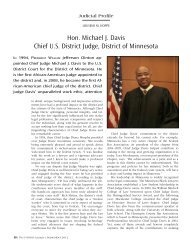Confidentiality Agreements: Delaware Courts Remind Us Why They ...
Confidentiality Agreements: Delaware Courts Remind Us Why They ...
Confidentiality Agreements: Delaware Courts Remind Us Why They ...
Create successful ePaper yourself
Turn your PDF publications into a flip-book with our unique Google optimized e-Paper software.
agreement is entered into with the potential target, the company’s flexibility to engage in a<br />
hostile takeover bid of the target at a later time may be greatly diminished.<br />
<strong>Remind</strong>er #2: A Seller Might Lie During Due Diligence and the Buyer Probably<br />
Can’t Do Much About It<br />
Another common provision in confidentiality agreements is a non-reliance clause. This type<br />
of clause typically states that a buyer may not rely on the completeness or accuracy of any<br />
information provided by the seller during due diligence, and that no sale contract exists<br />
between the buyer and the seller unless and until the parties enter into a definitive<br />
agreement. What happens when a seller is not completely forthcoming with a buyer during<br />
due diligence? Does the buyer have any recourse?<br />
The <strong>Delaware</strong> courts recently addressed these questions. In the case RAA Management LLC<br />
v. Savage Sports Holdings, Inc., Del., No. 577, 2011 (decided May 18, 2012), Savage<br />
approached RAA to discuss a possible merger and the parties entered into a confidentiality<br />
agreement. The agreement stated that Savage made no representations about the accuracy<br />
or completeness of any information it provided to RAA, and that Savage would not be liable<br />
to RAA based on RAA’s reliance on such information, unless Savage breached any<br />
representations or warranties made in a later sale agreement. Additionally, RAA waived any<br />
claims against Savage relating to the potential transaction unless and until the parties<br />
entered into a sale agreement.<br />
At the beginning of the discussions between Savage and RAA, Savage stated that there<br />
were “no significant unrecorded liabilities or claims against Savage.” However, during RAA’s<br />
due diligence process, Savage disclosed three major liabilities, which ultimately caused RAA<br />
to abandon the transaction. RAA sued, alleging that, had it known of those liabilities at the<br />
outset, it never would have pursued the negotiations and that because Savage had<br />
knowingly covered up the liabilities earlier in the process, Savage should be liable for the<br />
$1.2 million in costs that RAA incurred in performing its due diligence.<br />
The <strong>Delaware</strong> court dismissed the complaint based on the nonreliance and waiver clauses.<br />
On appeal, RAA argued that the nonreliance clause barred claims based on negligence or<br />
mistake, but should not be extended to cover fraudulent or intentional misrepresentations.<br />
Additionally, RAA argued that the Court should not enforce the nonreliance clause on policy<br />
grounds because such a rule would give sellers an incentive to lie during the initial stages of<br />
a transaction.<br />
The <strong>Delaware</strong> Supreme Court rejected RAA’s arguments, finding that the language of the<br />
agreement made no distinction between negligence and fraud, and that <strong>Delaware</strong>’s public<br />
policy favors enforcing written nonreliance clauses. The Court noted that, at the time of the<br />
agreement, both parties knew how nonreliance clauses had been interpreted by <strong>Delaware</strong><br />
courts and that RAA could not escape the terms it agreed to in its written agreement.<br />
The RAA case serves to remind us that, while due diligence is a tool designed to help buyers<br />
evaluate a possible transaction, buyers should not rely on statements or materials provided<br />
by a seller during due diligence. Many confidentiality agreements preserve the seller’s ability<br />
to limit its liability with respect to the quantity, quality, and timing of disclosures made<br />
during the due diligence process, perhaps even in the case where the seller makes<br />
fraudulent or misleading statements.


